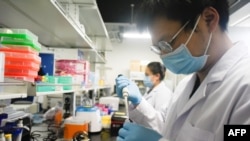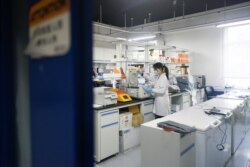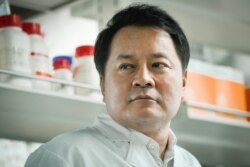Chinese scientists say a new drug is showing promising results in treating and preventing COVID-19, which could be effective in ending the pandemic before a vaccine is ready.
U.S. scientists say the Chinese treatment “has potential,” but it may take a long time before determining if it is a realistic option.
On Tuesday, scientists at Peking University told reporters that they took antibodies gathered from 60 people who recovered from COVID-19 and then determined which specific antibodies were most effective in killing the coronavirus in animal studies. They say their process may not only shorten the recovery time of COVID-19 patients but could provide short-term immunity to the virus.
The treatment itself is called “passive immunization.”
“It is analogous to a breast-feeding baby that ingests its mother’s antibodies while nursing. The maternal antibodies help to protect the baby from infection,” said Dr. Laura H. Kahn, a senior scholar at Princeton University’s Program on Science and Global Security. “These COVID-19 antibodies should theoretically help neutralize the virus and help prevent the disease, depending on how long the antibodies stay in the body.”
Dr. Zong-Mei Sheng, a vaccine expert with the National Institute of Allergy and Infectious Diseases, explained that the treatment works similar to donated plasma from recovered patients.
“I will not call it a drug. This is an antibody, just like right now, a hospital uses recovered patients’ plasma which contains neutralizing antibodies.”
Sheng told VOA that the SARS-CoV-2 neutralizing antibody can guard against the coronavirus so it can be used as both a treatment and prevention.
The Chinese treatment also could address one of the main problems in using donated plasma from recovered patients: the amount currently needed to fight the pandemic.
Sheng said that “because in patients, plasma cannot be produced on a large scale, that’s why they (Chinese study) try to use B-cell to make more. It’s a good ideal, but it’s a long process, and I don’t know whether it can be realistic,” she said.
The Chinese process essentially took antibodies from the 60 patients and ran them through sophisticated computers that sequence the various antibodies and determine how many kinds there are in the patients. Doctors then took those antibodies and treated infected mice.
The study’s lead scientist, Peking University’s Sunney Xie, told Agence France-Presse in an interview that the drug had been a success in animal trials.
"When we injected neutralizing antibodies into infected mice, after five days, the viral load was reduced by a factor of 2,500," said Xie. “That means this potential drug has (a) therapeutic effect.”
Given that this study has only completed clinical trials in small animals, it is an open question how long it will take before it can turn into an effective drug specifically for COVID-19.
Kahn told VOA that “it has to undergo Phase 1, 2 and 3 clinical studies to assess efficacy and safety before being approved for widespread use.
“These studies take time. I can’t give you an exact time frame,” Kahn said.
The Peking University study, titled “Potent neutralizing antibodies against SARS-CoV-2, identified by high-throughput single-cell sequencing of convalescent patients’ B cells,” can be found online on the Cell website.






